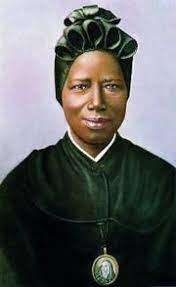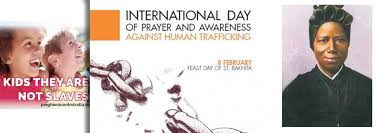 The Catholic Church celebrates the feast day of St. Josephine Bakhita on the 8th of February each year, her life was a journey from slavery to freedom and faith. The patron saint of Sudan, her life story inspires hope in the face of modern day indifference and exploitation.
The Catholic Church celebrates the feast day of St. Josephine Bakhita on the 8th of February each year, her life was a journey from slavery to freedom and faith. The patron saint of Sudan, her life story inspires hope in the face of modern day indifference and exploitation.
As Pope Francis states: “She is charged with showing to all the path to conversion, which enables us to change the way we see our neighbors, to recognize in every other person a brother or sister in our human family and to acknowledge his or her intrinsic dignity in truth and freedom. This saint, who lived at the turn of the twentieth century, is even today an exemplary witness of hope for the many victims of slavery; she can support the efforts of all those committed to fighting against this ‘open wound on the body of contemporary society.’” Pope Francis on the Celebration of the World Day of Peace 2015
Saint Josephine Margaret Bakhita was born around 1869 in the Darfur region of Sudan. She was a member of the Daju people and her uncle was a tribal chief. Due to her family lineage, she grew up happy and relatively prosperous, saying that as a child, she did not know suffering.
Historians believe that sometime in February 1877, Josephine was kidnapped by Arab slave traders. Although she was just a child she was forced to walk barefoot over 600 miles to a slave market. She was bought and sold at least twice during the grueling journey.
For the next 12 years she would be bought and sold and given away over a dozen times. She spent so much time in captivity that she forgot her original name.
As a slave, her treatment was cruel with several owners. She was sold to the Italian Vice Consul, Callisto Legani. He was kind to her. When it was time for him to return to Italy, she begged to be taken with him and he agreed.
After a long journey back to Italy, Legani gave her away to another family as a gift and she served them as a nanny. This new family had dealings in Sudan and when her mistress decided to travel to Sudan without Josephine, she place her in the custody of the Canossian Sisters in Venice. While with the Sisters she came to know about God.
When the mistress returned from Sudan, Josephine refused to leave the Sisters. This caused the Superior of the Institute for baptismal candidates among the sisters to complain to Italian authorities on Josephine’s behalf.
The case went to court, and the court found that slavery had been outlawed in Sudan before Josephine was born, so she could not be lawfully made a slave. She was declared free.
For the first time in her life, Josephine was free and could choose her own path. She chose to remain with the Canossian Sisters.
She was baptized in 1890 and three years later became a novice with the Canossian Daughters of Charity and took her final vows in 1896. For the next 42 years, she worked as a cook and doorkeeper at the convent. She was known for her gentle voice and smile.
She died on February 8, 1947. She was canonized by Saint Pope John Paul II on October 1, 2000. She is the patron saint of Sudan.
To read the full account, please click here
The International Day of Prayer and Awareness Against Human Trafficking
 This Day of Prayer is held on February 8th each year. In addition to prayer, the day is a call to action:
This Day of Prayer is held on February 8th each year. In addition to prayer, the day is a call to action:
“Our awareness must expand and extend to the very depths of this evil and its farthest reaches…from awareness to prayer…from prayer to solidarity…and from solidarity to concerted action, until slavery and trafficking are no more,” says Cardinal Peter Turkson.
In this sense another goal of the day is to encourage people to act and to take concrete steps to help eradicate slavery and trafficking. Indeed, an essential part of freedom is our ongoing effort to ensure it is woven into the fabric of our society.
To access resources for the International Day of Prayer, please click here
To access the Corporate Stance of the Missionary Sisters, please click here
